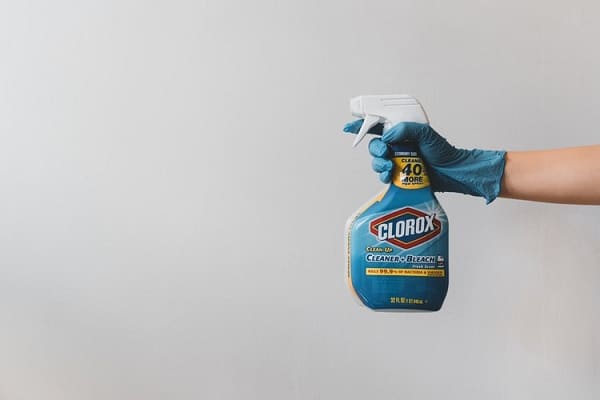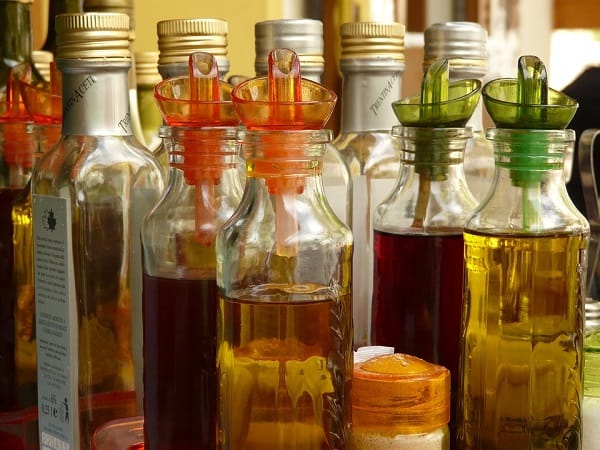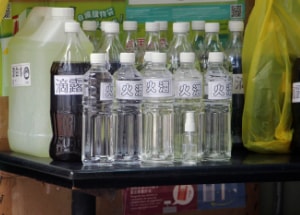Nowadays, everybody wants to maintain the highest level of protection from microbes and bacteria at their homes. In particular, we want to protect ourselves from viruses, tiny micro-organisms that can cause various illnesses, including respiratory diseases.
Completely eradicating such organisms from all the surfaces at your place isn’t easy, but disinfecting your home regularly would help to keep them away.
Once you have extensive knowledge of the products to use to eradicate germs, viruses, and bacteria, among other infectious organisms, from your environment, nothing can prevent you from living in a healthy environment free from microbe-caused infections.
That’s why, in this article, I want to share knowledge on how to use ammonia to clean your home and protect yourself and your close ones from dangerous germs.
Ammonia – Why You Should Have It in Your Home?
Keeping the house clean can be a somewhat tedious activity. However, with the knowledge of cleansing basics, sparing a few minutes of your day getting rid of possible bacteria and germs, among other infectious microorganisms, can go a long way towards keeping your house safe.
Ammonia, an environment-friendly cleaner, can provide you with satisfactory service on this matter. However, it is essential to know about the products that should be used in combination with this product to reach the desired effect.
What Is Ammonia Used For? The Multiple Options

Ammonia has many uses that include purifying water needed in manufacturing certain products, such as pesticides, fertilizers, and household cleaning agents.
Like any other sanitizers, the main purpose of using ammonia is to clean your area, and household ammonia cleaning uses are numerous. They include removing grease from surfaces, cleaning filthy oven racks and grills, removing smells from rooms, and removing soapy residues.
Does Ammonia Kill Germs? The Facts
Even though ammonia is not registered as a disinfectant, it performs great when it comes to playing the sanitizing role and killing some specific germs. For instance, it is effective for eliminating foodborne pathogens, such as the E-Coli and the salmonella.
But does ammonia kill bacteria? Ammonia is not very effective for getting rid of viruses, bacteria, and other pathogens. It is the reason why the EPA has not yet listed it among the sanitizers that work as disinfectants, too. Therefore, it can’t act in such a capacity as a bleach alternative for disinfecting.
However, there are several products containing ammonia called quaternary ammonium compounds (QACs) that can kill viruses and are EPA certified.
Does Ammonia Kill Mold?
Even though ammonia is not 100% effective when it comes to killing some fungus and bacteria, it doesn’t mean it can’t help you with protecting your home from dangerous microorganisms.
You can boost its sanitizing power using a home-based steamer. Since steam kills 99% of the bacteria and fungus, you can follow up ammonia clean-up with a steamer.
The steam ensures that all the molds on the surfaces are suppressed and the areas are left sparkling clean. Thus, if you use ammonia treatment in combination with a steamer, most fungus on the targeted surface will be wiped out, leaving the area clean with a striking look.
Moreover, it is an effective way to curb the release of toxic gases in case you follow up ammonia cleaning with a bleach-based sanitizer. The sanitizing power of ammonia plays an important role in keeping the environment safe for the inhabitants.
However, molds sometimes tend to be resistant to hot water. To effectively remove them from a surface, clean it with ammonia, apply the steamer over it, and then introduce chlorine bleach to ensure the molds are wiped off completely.
Ammonia as a Disinfectant – Why It Should Be Present in Your Home
While ammonia proved to be a powerful cleaning solution for eradicating stains, it doesn’t work as a disinfectant. However, it can play a role as a curtain-raiser for an ideal disinfectant. Therefore, if you want to disinfect a particular surface, begin with ammonia cleaning.
This treatment will ensure that the surface you are about to disinfect is dirt-free hence giving room for thorough disinfection. Ammonia has a high evaporation rate so that it will disappear faster from a surface compared to soapy water, thus, giving room for faster disinfection. For example, such an approach will be extremely effective for window panes.
Does ammonia disinfect if mixed with water? Not really. It only provides a superb cleaning effect. Here’s how to use ammonia to clean items and surfaces:
- Dilute with warm water;
- Mix it in a spray bottle and splash the solution on the targeted surface;
- Let the splash sit on the sprayed surface for at least five mines;
- Use a paper towel to wipe off the spray;
- Rinse with distilled water;
- Treat the cleaned surface with a disinfectant.
Ammonia Vs Bleach: Which Product to Use for Laundry?

Ensuring the high levels of hygiene in your laundry is crucial. Pathogens are likely to spread through the washed clothing if you don’t use the right cleaning products. If you mix your laundry with the clothes of family members that are sick, disinfecting the laundry is a key step in preventing the further spread of the infection.
Does ammonia disinfect laundry? Ammonia will not play a great role in sanitizing the laundry, but a bleaching agent will do. But you can apply ammonia to clean your laundry and rinse the items with distilled water before disinfecting them with a bleaching agent.
Do not mix bleach with ammonia. Since both ammonia and bleach are great in their specific capacities, some people think that mixing both products may boost their potential, but that is not the case. When these two compounds are combined, they produce chloramine, a deadly gas that causes shortness of breath. Such a mix is surely dangerous.
Can ammonia kill you when laundering? Only if combined with bleach. The deadly gas that results in the mixing of these products can irritate your skin and eye, and if produced in large quantities, it may result in death.
Ammonia Cleaning Tips – How to Be Safe while Using Ammonia
What can you clean with ammonia? Ammonia is one of the best cleaning products recommended by chemical safety organizations. It is the most effective in removing the most stubborn stains and cleaning surfaces from grease, dirt, and grime, among others.
Ammonia’s smell is harsh and very distinct from other products. Thus, it is always recommended to ventilate your place when using this product. Do you know how to clean with ammonia? Here are some tips to ensure your safety and excellent cleaning results:
- Wear gloves – It is a strong chemical that can dry and irritate your skin.
- Apply steam or distilled water – After cleaning with ammonia, use steam or distilled water on the surface if you are planning to follow up with a bleaching agent.
- Use distilled water to dilute ammonia of up to 50/50 solution.
- Let the ammonia sit for five minutes on a surface – for a sparkling clean surface, ensure that the ammonia solution sits on the surface for at least five minutes before removing it using distilled water. For stubborn stains, let the product sit on the surface for at least twenty minutes.
- Test your ammonia or water solution firstly – Before you apply the solution all over the area, try testing it on a hidden patch of the targeted surface before you spray it on the entire place.
- Be cautious of ammonia fumes – Don’t let ammonia fumes irritate your skin or eyes, as it can lead to ammonia poisoning. Once you start experiencing an irritation-like feeling, stop working with the ammonia, and rinse the solution with water immediately. Then sit outside in the fresh air for some time.
- Toss the used cleaning materials separately – After you are done with the cleaning, get rid of both the paper towels used with ammonia solution and the bleaching agents separately, don’t place them in the same container.
Common Ammonia Based Cleaners
With the wake of different deadly viruses, bacteria, and germs, cleanliness is a priority in people’s lives today. Ammonia is the best cleaner you can find on the market. Are you aware of ammonia-based products to store in your home to enhance hygiene levels? Here are some of them to note.
Window and Glass Cleaner
Ammonia is one of the best window cleaners you can find today, and many companies produce ammonia-based products for cleaning items made of glass. When appropriately used, such solutions are safe, reliable, and efficient.
Thus, ensure that you are using this product in free space to have proper ventilation and avoid respiratory irritation that may arise in areas that lack adequate air circulation.
[amazon box=”B00UNGRC5M” template=”horizontal” tracking_id=”is-ammonia-a-disinfectant-20″]
Toilet Wand/Bowl Cleaner
Anytime you come across a toilet cleaner with a pungent smell, the ammonia component is the culprit. It ensures the cleanest bowls, so you can rely on the manufacturer’s tips and follow the safety steps when using such a product.
Drain and Oven Cleaner
Ammonia plays a significant role when it comes to cleaning stubborn stains on pipes and ovens. However, you need to be extra careful when handling an ammonia/water solution since it’s irritating to the exposed skin. Note that first, you need to clean your oven with safe cleaners, like salt or baking soda, before introducing ammonia to finalize the washing process.
[amazon box=”B002M8NEDS” template=”horizontal” tracking_id=”is-ammonia-a-disinfectant-20″]
Factors to Consider When Purchasing Ammonia Disinfectant
Buying ammonia cleaning products is not like purchasing any other regular household necessities. You need to have several aspects in mind before deciding on what exact product to buy.
Time of Action
No one wants a non-effective product, and it is not exceptional when it comes to ammonia solutions. Thus, you should check on the ammonia products that ensure the surface sprayed becomes sparkling clean after a short time. An item that acts effectively on dirt and is not severe to human skin is the best one to use.
Microbe Range
Does the ammonium product you are about to buy work effectively over a wide range of microbes? A product that kills many types of bacteria and viruses is more effective than one that kills a specific type of microbes only since a surface can harbor more than a single type of germs.
A friendly tip, consider purchasing ammonia-based products with quaternary ammonium compounds at the same time to ensure full protection against viruses and bacteria.
Odor and Safety
Depending on where you want to use the product, consider its odor. A solution with less irritating smell will go along well in ensuring a great service more so if it is applied inside the house. Therefore, figure out whether the product you are about to purchase is safe to use indoors. For instance, is the treatment less irritating in terms of its odor, or effect on the skin?
Cost
Everybody wants the best option when it comes to effectiveness. However, is the product you are about to buy within your budget? Understand your buying potential and analyze the best products within this range before making a purchase.
FAQ
Ammonia offers many benefits at home, particularly regarding cleaning. The benefits, however, would only be seen if proper usage is followed. Besides, if used improperly, ammonia can result in skin irritations and not fully cleaned areas. This is why many people have questions regarding the usage of this compound. Here are some of the commonly asked ones:
-
Can you mix ammonia and vinegar?

While mixing ammonia and vinegar is not dangerous, it has some implications, too. The basic and acidic properties of these products cancel each other out hence becoming counterproductive.
The acid in vinegar reacts with the base in ammonia to form salty water. Therefore, these products will rob each other’s cleaning properties, resulting in a non-effective cleaning agent. So, can you mix ammonia and vinegar, even when one is in a small quantity? No, there’s no point in doing it.
-
Can you mix ammonia and bleach?
Combining ammonia and bleach is dangerous. It forms a chloramine gas that is toxic and can be irritating to eyes and skin. Besides, large quantities of this gas could result in death.
-
What can you clean with ammonia?
Ammonia can clean a wide variety of household materials. For example, it can help you with getting rid of stubborn stains, if you mix it with water and detergent. Thus, if you have a surface stained with grease, grime, or any other dirt, ammonia-based products will deal with it effectively.
Related Posts:
- What Is the Difference Between Sterilization, Sanitization, and Disinfection?
- Is Hydrogen Peroxide a Disinfectant
- Is Pine Sol a Disinfectant
Final Remarks
Ammonia offers many cleaning benefits and should always be present in your cleaning arsenal. Choosing the most efficient ammonia-based product goes a long way if one is not familiar with ammonia uses and doesn’t know the specifics of its application.
First of all, you need to figure out whether the cleaning aspects of the ammonia-based product you are about to buy are what you need. The guide presented above should help you with this consideration tremendously. In short, is ammonia a disinfectant? No, but it’s an extremely effective cleaning solution.
If you purchase an ammonia-based cleaning agent, don’t forget to follow the safety precautions provided by the manufacturer. As mentioned earlier, if ammonia isn’t used carefully or if mixed with bleach, it can result in dangerous gas produced. Also, don’t mix ammonia with vinegar since doing so will negate its cleaning properties.
References:
- Dangers of Mixing Bleach with Cleaners (Washington State Department of Health):
https://www.doh.wa.gov/YouandYourFamily/HealthyHome/Contaminants/BleachMixingDangers - Ammonia poisoning (National Library of Medicine):
https://medlineplus.gov/ency/article/002759.htm - Quaternary Ammonium Biocides: Efficacy in Application (American Society for Microbiology):
https://aem.asm.org/content/81/2/464 - Vinegar (Wikipedia):
https://en.wikipedia.org/wiki/Vinegar

